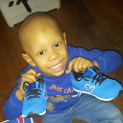Engineering the CAR T Cells to Overcome Tumor Derived Immune-Inhibition in Glioblastoma

Background
Outcome for children with glioblastoma (GBM) is extremely poor. It is highly resistant to conventional methods of cancer treatment and less than 16% of children survive more than five years after diagnosis. In addition, aggressive combined therapy causes significant harm. Recent advancements in cancer immunotherapy have enabled us to genetically engineer patients' own T cells to express artificial molecules called chimeric antigen receptors (CARs) that specifically recognize the GBM-associated protein, human epidermal growth factor receptor 2 (HER2). A phase I trial for HER2 immunotherapy was safe with no treatment-related toxicities and offered clinical benefit to 50% of treated patients. To put our results in perspective, the median survival doubled compared to the other salvage interventions for GBM patients failing front-line therapy. However, there is a need to improve the killing activity of these T cells, since tumor-derived immune-inhibitory molecules present at the tumor site can turn-off these cells upon encounter. Blocking this immune-checkpoint using monoclonal antibodies has improved outcomes for a subset of resistant cancers, but the best means for overcoming this tumor derived inhibitory mechanism in the central nervous system (CNS) is largely unknown at present.
Project Goal
Our methodology will enable the T cells to kill GBM cells expressing HER2 and overcome/transform the immune-checkpoint in favor of T cells without organ-system toxicities. This study has the potential to dramatically improve outcomes for GBM patients upon translation in to a clinical trial and advance information leading to future standards in pediatric brain tumor immunotherapy.
"Immunotherapy as a treatment promises higher cure rates and low treatment-related toxicities, especially in children affected by brain tumors. Achieving this promise of immunotherapy entails refinement and precision at every step of its application to fully benefit the pediatric community that we treat at Texas Children's Cancer Center/Center for Cell and Gene Therapy. Hence, we strive incessantly to accomplish this vision through highly collaborative and innovative research, where I focus on creating a 'T-cell platform' that is resistant to the inhibitory pathways within the tumor environment that can cripple effectiveness of cellular therapeutics. I sincerely appreciate Alex's Lemonade Stand Foundation for partnering with us on this quest to develop effective targeted cellular therapeutics with a goal of preserving the quality of a child's cancer-free life."

